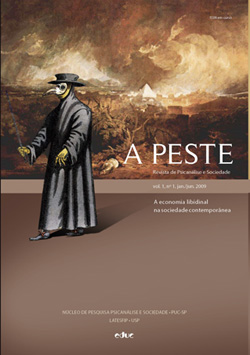As normas imperfeitas: instituições jurídicas e destinos pulsionais
DOI:
https://doi.org/10.5546/peste.v1i1.2703Resumo
Resumo: Tem-se como objetivo testar a viabilidade de uma articulação entre subjetividade e democracia baseada na retórica dos desejos que, sob determinadas condições a serem precisadas, podem solucionar os impasses causadores de sintomas. Coloca-se a questão de saber se os argumentos pelos quais os desejos singulares se constituem são dependentes de uma lógica. Aprecia-se que a retórica dos desejos não se articula ao político em um sentido definido acima da democracia, pois o desejo não pode ser resumido a uma lógica. Posteriormente, trabalhase com dois exemplos clínicos que ilustrarão a retórica no campo da análise e demonstram que a repetição e a significância de desejos não são primeiramente reguladas por uma lei universal da sexuação. Definese singularidade a partir de um impasse na história de relações ao gozo e das identificações, apontando que singular não se opõe ao universal. Apoiado na concepção hegeliana, afirma-se que a singularidade não é sempre determinada como a síntese do universal e do particular, mas que ela designa a materialidade de dispositivos reais. Ao abordar afetos e política, com base na teoria do direito abstrato de Hegel, conclui-se que o social e o político oferecem aos impasses de desejo modos-tipos de substituir suas apostas e de se desconhecer, e, por isso, tem-se a riqueza dos conflitos sociais tratáveis onde as paixões seriam intratáveis. Ao legislar sobre as propriedades, o direito abstrato no sentido hegeliano do termo, possui não apenas uma função econômica, mas também uma função simbólica. Finalmente, considera-se que a opacidade residual na transposição de desejos ocasionada pela política e o social pode ser fecunda pela relativa impessoalidade de sequências de atos que ela põe em forma. Conclui-se assinalando a possibilidade de uma “subjetividade democrática” que permita às subjetividades transpor seus conflitos subjetivos sem os explicitar. Palavras-chave: psicanálise; política; direito; desejo; singularidade; democracia. Abstract: The aim of the present paper is to test the feasibility of an articulation between subjectivity and democracy based on the rhetoric of desire which, under certain conditions that need to be accurately expressed, can solve the impasses that cause symptoms. It is discussed whether the arguments through which singular desires are constituted depend on a logic. It is argued that the rhetoric of desire is not articulated with politics in the above mentioned sense of democracy, because desire cannot be summarized as a logic. Then, two clinical examples illustrate the rhetoric in the field of analysis and show that the repetition and significance of desires are not primarily regulated by a universal law of sexuation. Singularity is defined based on an impasse in the history of relations to enjoyment and of identifications, and it is shown that singular does not oppose to universal. Based on the Hegelian conception, it is stated that singularity sometimes is not viewed as the synthesis of universal and particular; rather, it denotes the materiality of real devices. By approaching affections and politics, in light of Hegel’s theory of abstract right, it is concluded that the social and the political offer to the impasses of desire modes-types of substituting their bets and of failing to know oneself. Due to this, there is the richness of the social conflicts that can be treated where passions would not be treated. When the abstract right in Hegel’s sense legislates about properties, it has not only an economic function, but also a symbolic one. Finally, it is considered that the residual opacity in the transposition of desires caused by politics and by the social can be fruitful due to the relative impersonality of sequences of acts that it puts into form. The paper is concluded by signaling the possibility of a “democratic subjectivity” that allows subjectivities to transpose their subjective conflicts without explaining them. Keywords: psychoanalysis; politics; right; desire; singularity; democracy.Métricas
Carregando Métricas ...
Downloads
Como Citar
David-Menard, M. (2010). As normas imperfeitas: instituições jurídicas e destinos pulsionais. A PESTE: Revista De Psicanálise E Sociedade E Filosofia., 1(1). https://doi.org/10.5546/peste.v1i1.2703
Edição
Seção
Artigos

